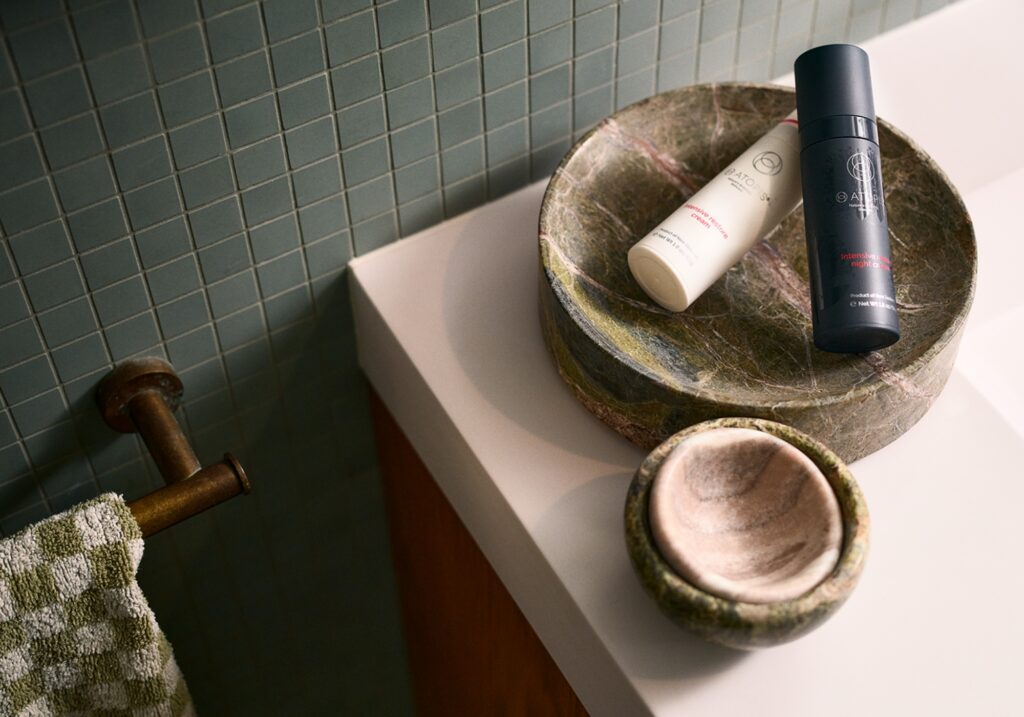If you’re familiar with skincare brand Augustinus Bader, this story might have a similar ring to it. Like Dr Weir, its creator, Professor Augustinus Bader, is a cell biologist. Both have turned their attention to skin, though whereas German-born Bader has capitalised on celebrity backing for his popular luxury products, Dr Weir has relied on the strength of her scientific knowledge and natural, New Zealand ingredients in the creation of the Atopis range and her globally patented ingredient – Myrecil®.
There is beauty in the science. “Even something as common as sun-damaged or prematurely aged skin, very common here in New Zealand with our high UV levels, suddenly gets a new lease of life,” says Dr Weir. “Our users often say that people ask what make-up they’re wearing — and they’re not wearing any. Some even get friends asking if they’ve had work done.”
Below, we unpack the science behind the Atopis range and introduce the skincare duo that doubles down on the skin damage cycle to reveal radiant, youthful, healthy-looking skin. But first, we need to understand how the ingredients at the heart of their efficacy are producing breakthrough results and why your trusty retinols might be doing more harm than good.
The skin-changing magic of Myrecil®
Dr Weir looked to the fundamental biochemical processes at work in both plants and animals to develop Myrecil® – clinically trialled, globally patented breakthrough in skin health that works with your own natural cellular defence and renewal systems to restore your skin – which sits at the heart of Atopis and AtopisMed products.
Why your skin can benefit from Myrecil®:
Plants can turn on different biochemical pathways in response to environmental factors such as UV light or toxins. Dr Weir learned how to activate signalling pathways that turn a damaged, mature leaf cell back into an embryonic leaf cell. This is what Myrecil®, does — it activates plant stem-cell pathways to produce compounds that can then be used to promote the same type of cell renewal and regeneration in human skin.
Atopis combines Myrecil® with New Zealand ingredients. Dr Weir says, “New Zealand still has a lot of natural, untouched plant and insect ecology with interesting and powerful bacterial probiotic effects that are not well understood yet. Working with these, we’ve been able to release important nutrients in a form your skin and gut microbiomes can absorb, as opposed to just passing through or bouncing off you.”
Introducing the Intensive Skincare Duo
Intensive Restore Cream, $99
As well as The Myrecil® Ingredient, new Intensive Restore uses a complex combination of vitamins, amino acids, fatty acids, antioxidants, and minerals that all work together to nourish to your skin’s cellular defence and renewal systems. Ideal for restoring both facial skin and décolletage.
Intensive Restore Night Cream, $119
Scientifically developed for mature and dry skin in need of hydration and cellular renewal, Atopis Intensive Restore Night Cream delivers the ultimate hit of night-time hydration to intensively repair, restore and rejuvenate ageing skin from deep within.
Like retinol but without the reaction
“A problem with retinols,” says Dr Weir of the ingredient that has become standard in the beauty sector, “is that they’re turning on the stress pathways of apoptosis and thereby putting the skin into ‘defence’ mode. This means the overuse of retinols has the potential in the long-term to cause damage and weakness of the skin. It also results in the skin becoming habituated and needing more retinol for the beauty benefit to be seen. In order to get the same visible benefits from retinols as we age, the dose increases, which is bad for the long-term health of the skin.
“The skin industry is just offering more and more without warning women of the long-term risks.”
Long-term use of retinols is known to cause redness, thinning, premature ageing, increased sun sensitivity and more serious issues.
What is the skin damage cycle and how can we break it?
In its simplest form, the skin damage cycle suggests that our means of ‘treating’ damage ultimately causes more damage; how we respond to damage or signs of ageing in turn produces more damage and results in premature ageing.
Myrecil® uses a new and innovative cellular pathway that doesn’t stress your skin cells like retinols do to produce their effects. Atopis products work with your body’s inbuilt cellular systems to heal damaged epidermis and resetting the underlying skin’s natural moisturising systems, reduce flare-ups, skin sensitivities and hormonal break-outs by rebalancing the skin’s microbiome, and reduce redness and irritation in the skin – ideal for those with rosacea or eczema-prone skin.
Other known benefits from harnessing the magic of Myrecil® includes neutralising free radicals, protecting proteins in the skin such as collagen, controlling the nitric oxide levels within the skin cells for increased cell renewal, inflammation reduction, and protection against environmental damage, and lastly, to boost vitamins in the skin to nurture cellular health and structure.
Designed to reverse the skin damage cycle for prematurely ageing or damaged skin, Atopis Intensive Restore works to heal your skin’s epidermal layer and microbiome, while below it, Myrecil® resets the subdermal and transdermal systems, so they can naturally and effectively moisturise themselves.
These new, healthy skin-cell layers rise up to form a new, restored epidermis that’s not only intensely hydrated, but is also equipped with a strengthened cellular skin matrix. With the damage cycle now reversed, your skin’s natural plumpness returns, its tone become more even, wrinkles, lines and redness reduce, and you gets what users call “the Atopis glow.”
Discover the Atopis range for yourself. Visit atopis.co.nz

Dr Iona Weir
After being introduced to the world of science at an early age, the high-flying Kiwi has gone on to a career that’s as jaw-droppingly impressive as it is ripe with potential.
Dr Weir gained her PhD from the Cancer Research labs of the University of Auckland through being the first to discover that the fundamental cellular process of apoptosis (programmed cell death) in plants could be reversed. She later went on to apply this to human cancer and immune cells. As she explored the connections between cell signalling, gut health and immunology, she saw how these inner processes could have a remarkable effect on the outside of the body too — on the skin.











